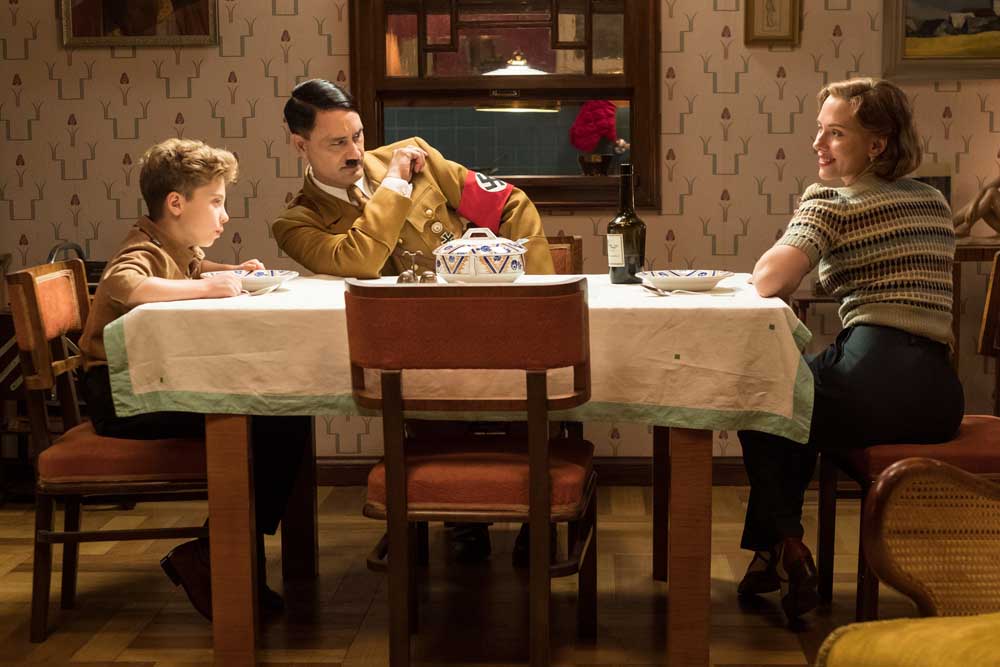‘Jojo Rabbit’
Published 12:00 am Thursday, November 14, 2019

- Jojo (Roman Griffin Davis) has dinner with his imaginary friend Adolf (writer/director Taika Waititi) and his mother, Rosie (Scarlett Johansson), in the World War II satire "Jojo Rabit." (Kimberley French/Twentieth Century Fox)
In the uncomfortably funny, unapologetically insensitive, cheerfully outrageous “Jojo Rabbit,” writer-director Taika Waititi (“Thor: Ragnorak”) delivers a timely, anti-hate, fractured fairy tale AND turns in hilarious work as Adolf Hitler, imaginary friend to a 10-year-old German boy near the end of World War II.
No, really.
Trending
From Charlie Chaplin’s “The Great Dictator” to Ernst Lubitsch’s “To Be or Not to Be” to Mel Brooks’ “The Producers” to even something as stupid as the TV show “Hogan’s Heroes,” there have been any number of satires skewering Hitler and Nazi Germany, but it IS surprising for a film such as “Jojo Rabbit” to get the green light in the current, comedically careful climate.
Based on the 2004 novel “Caging Skies” by Christine Leunens (adapted by Waititi for the big screen), “Jojo Rabbit” is set in the fictional German town of Falkenheim, where a 10-year-old boy named Jojo (Roman Griffin Davis) is hopping with excitement because today will be his first day to train with the Hitler Youth and become fully indoctrinated into the cause.
Jojo worships Hitler as some kind of near-mythical superhero. He swallows even the most insanely ignorant and hateful propaganda about the Jews, even believing they have horns and they sleep upside down like bats. As Jojo excitedly dons his uniform, he receives a pep talk from his imaginary friend Hitler, played (hilariously) by Waititi as a vainglorious buffoon who is a kind of devil on Jojo’s shoulder, spewing bilious pep talks whenever Jojo wavers or expresses doubt about the cause.
Director Waititi blends the slapstick jabs with more subtle humor and with impactful dramatic moments in the scenes involving the characters of Jojo’s mother, Rosie (Scarlett Johansson), a protective mother and independent spirit who plays the part of the loyal German citizen but is in fact working and risking her life for the resistance, and Elsa (Thomasin McKenzie), a 16-year-old Jewish girl hiding out in a secret upstairs room in Jojo’s house.
Jojo is deeply conflicted about the discovery of the hated enemy in his own house. He wants to turn her in, but that would mean his mother would be executed as a traitor, leaving him all alone.
The New Zealand actress Thomasin McKenzie, who demonstrated undeniable star power in last year’s “Leave No Trace,” turns in equally nuanced and authentic work here as Elsa, who gradually finds a way to teach Jojo he’s too smart to actually believe the hatred preached by his imaginary friend Hitler, and all those idiotic stories about the supposedly evil Jews. By the time Jojo comes to realize Elsa’s just a girl, and the real monsters are those who would hunt her down and kill her just because of who she is, he believes he came to that conclusion all by himself.
Trending
Scarlett Johansson turns in one of the best performances of her career as Jojo’s mother, who will do anything to protect her son, but is also willing to risk her life every day as part of the underground effort to rid her homeland of its poisonous regime.
“Jojo Rabbit” draws upon the past to make salient points about the state of the world today, with Waititi urging us (sometimes in not-so-subtle ways) to pay attention to history, to learn from it, to strive to be better. Hardly a new message, but still one well worth delivering.
And if it takes a cartoonishly dopey Hitler character to help send that message, why not.








